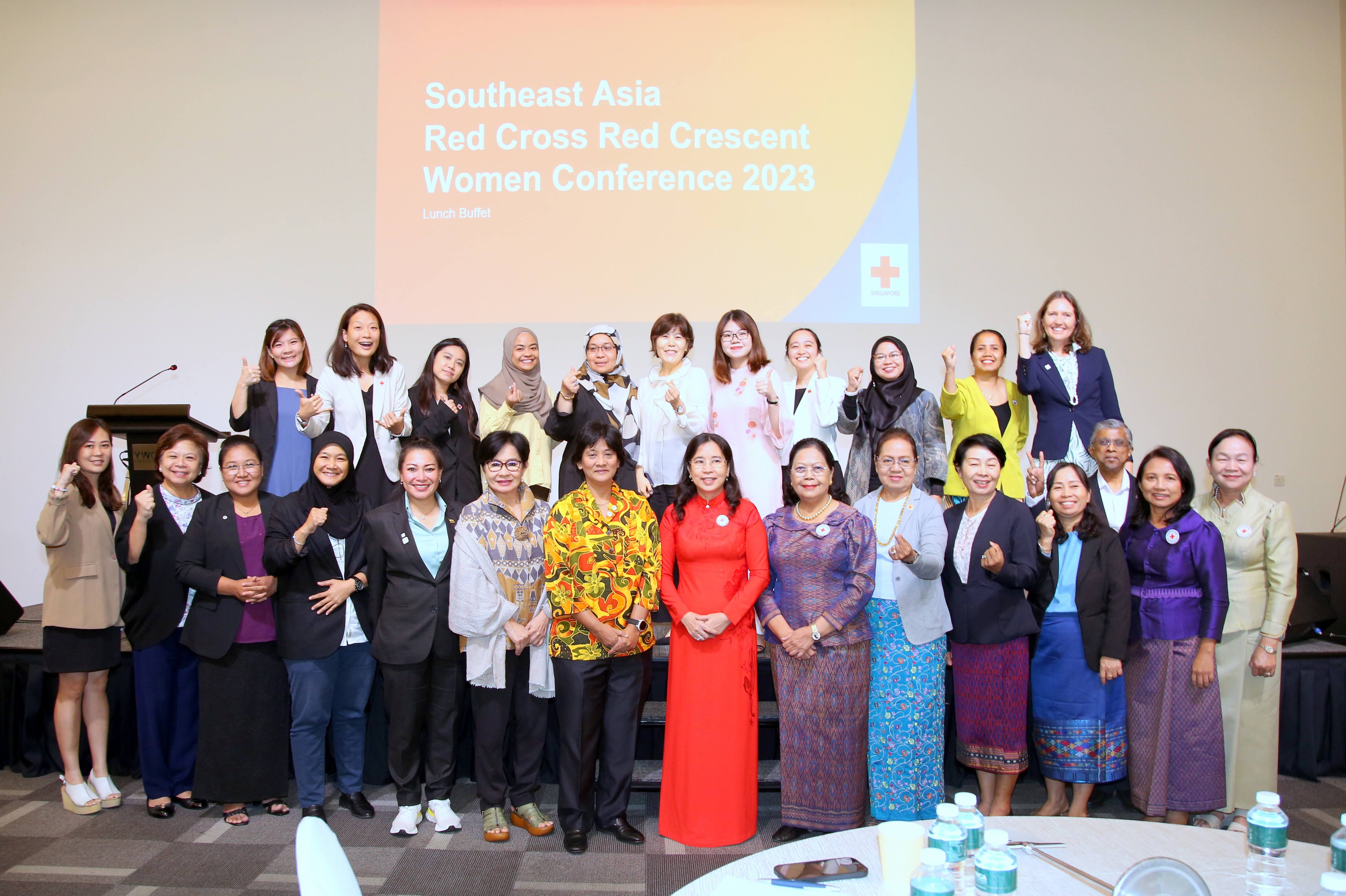
Women as Indispensable Humanitarian Actors, and Leaders
Approximately 120 Diplomats, delegates from Red Cross and Red Crescent National Societies, volunteers, supporters and employees attended the inaugural Southeast Asia (SEA) Red Cross Red Crescent (RCRC) Women's Conference, presented by the Singapore Red Cross (SRC), at YWCA's Sophia Cooke Ballroom on 21 August.
The event was targeted at amplifying collaboration, creating a platform for women leaders in the SEA RCRC Societies to share their insights and experiences, and developing actionable strategies towards supporting women's empowerment and capacity building in SEA for humanitarian action.
Empowering Women to Respond to Humanitarian Challenges
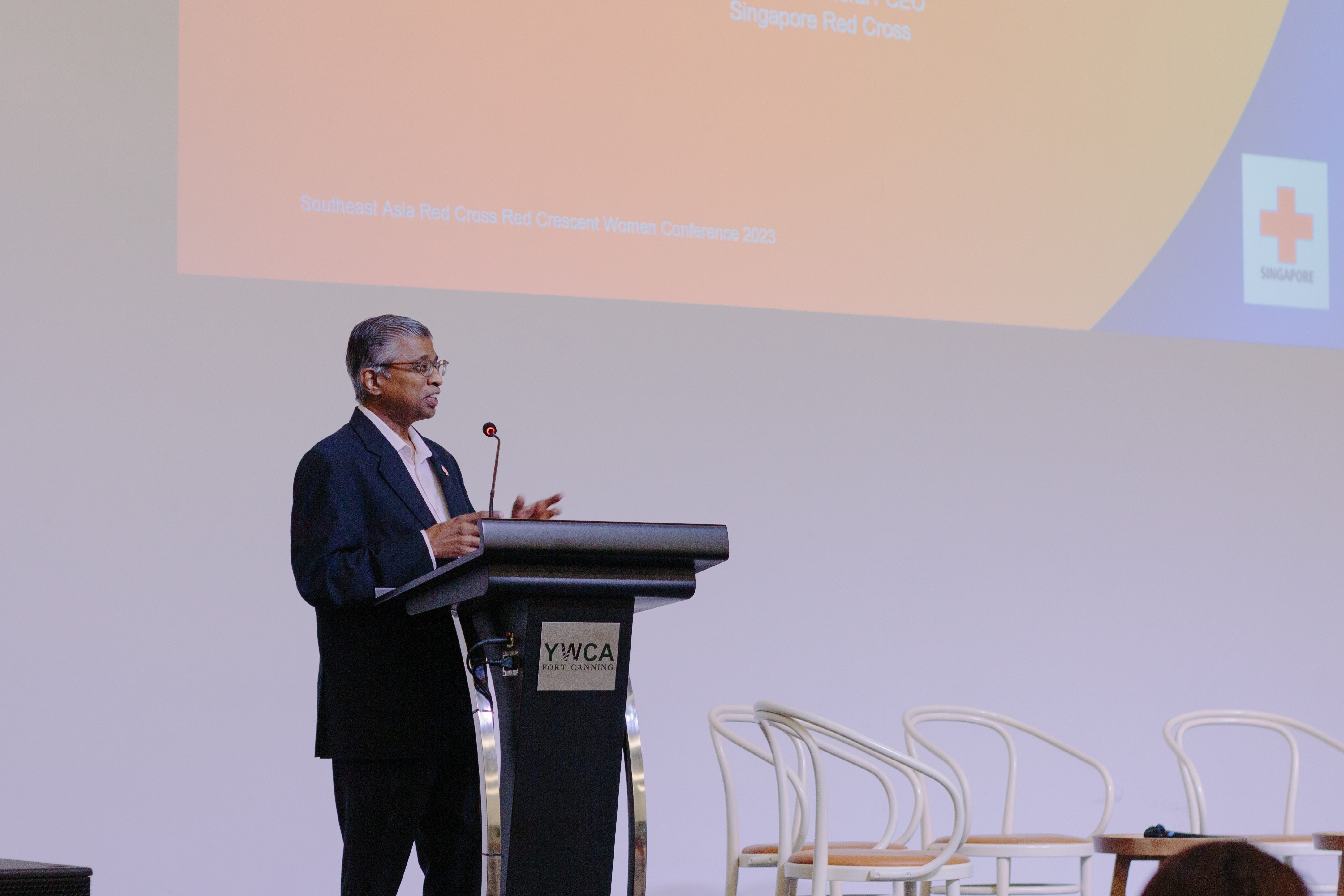
"Women's voices must be better heard. Their role as active actors in humanitarian work must be acknowledged," said Mr Benjamin William, Secretary General / CEO of the SRC in his welcome address. He added that greater women's representation in the humanitarian sector will enhance the efficacy and relevance of humanitarian interventions and empower humanitarian organisations to meet the mammoth humanitarian challenges facing mankind.
To address some of the humanitarian challenges, he called for women, as agents of change, to spearhead mental health, climate and sustainability resilience initiatives. Mr William espoused the participation of women in the One Billion Coalition for Resilience, to enhance community resilience. The One Billion Coalition for Resilience (1BC), a target set by the International Federation of Red Cross and Red Crescent Societies (IFRC), provides an opportunity for individuals, households, communities, and organisations to collaborate to amplify the collective impact of resilience-building in communities worldwide.
"More women leaders can transform the humanitarian system to better meet the needs of those affected by conflict and humanitarian emergencies," he said.
These efforts will bolster the disaster/crisis response and preparedness, enhance the forms of assistance rendered, ramp up the means of delivery, and enhance the protection of women while amplifying the capabilities and capacities to better meet the needs of those affected by conflict and humanitarian emergencies.
"We need women to play a greater role in humanitarian innovation," he urged, calling on women to champion the adoption of digitalisation and technology in the humanitarian sector.
Protecting Women in Disasters
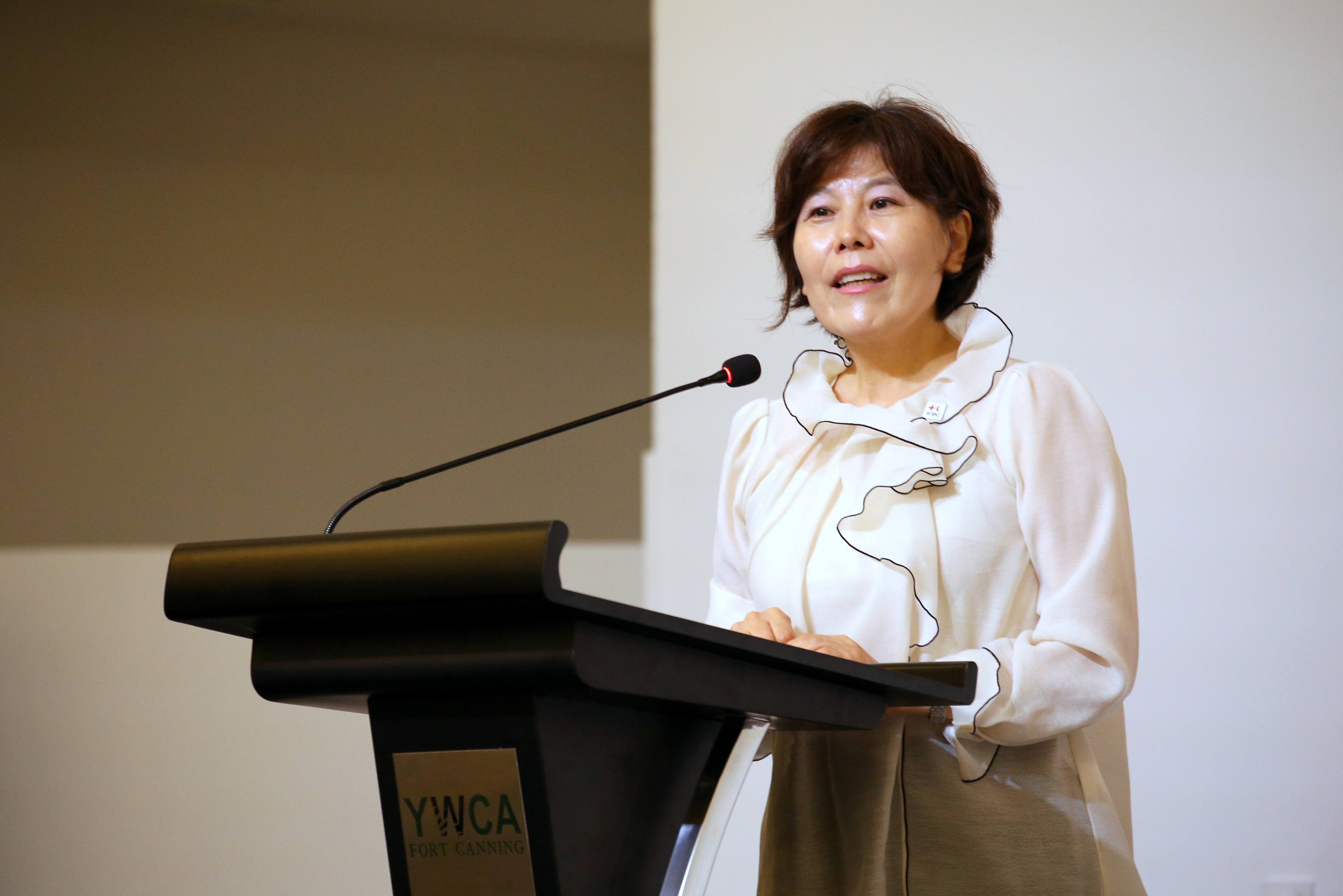
Ms Juja Kim, Deputy Regional Director, of the IFRC, shared a heartwrenching statistic in her welcome address.
"In times of disasters, women and children are 14 times more likely than men to die," she said, citing research by the International Union for Conservation of Nature (IUCN).
She called for humanitarians to explore ways to enhance the resilience and protection of women in conflict and humanitarian emergencies.
To make strides in the protection of women in conflict and humanitarian emergencies and ensure gender parity, Ms Kim shared that the IFRC Asia Pacific had established the target of having a 50 per cent representation of women in leadership positions in the humanitarian sector. Yet, the National Societies in the region are a long way from accomplishing the goal. In SEA, women's leadership representation currently stands at 32 per cent.
"We are actively advocating for women to reach leadership positions in the humanitarian sector. Since 2022, we have been working on mentoring, leadership capacity, networking, and improvements in human resource policy to retain women. Women can be good humanitarian actors and good influencers," she said.
She advocated for greater women empowerment through the investment and support of women to attain leadership positions in the humanitarian sector.
Protecting and Safeguarding Women's Well-Being
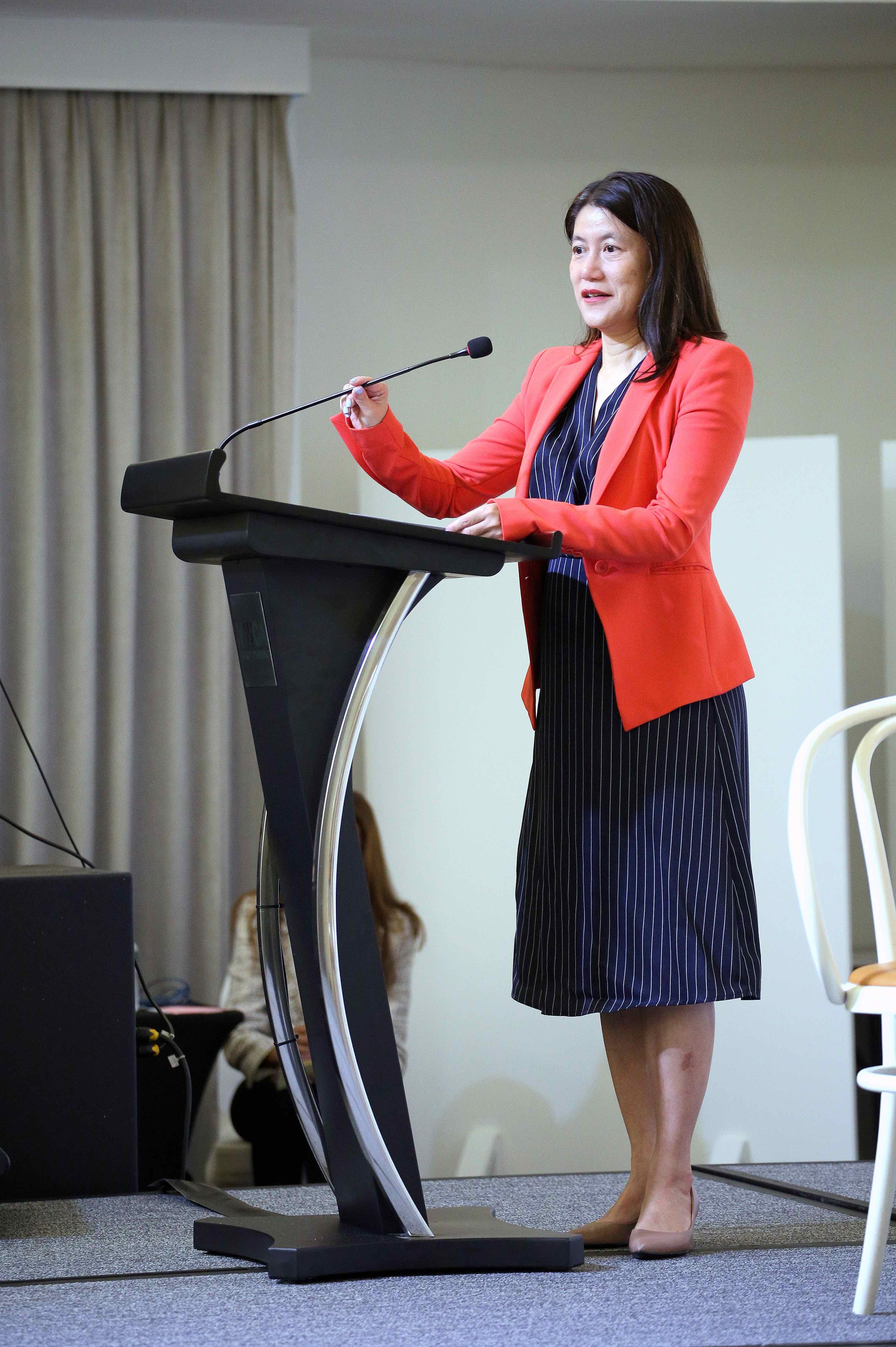
In her keynote address, Ms Foo Chi Hsia, Deputy Secretary (SEA & ASEAN) at the Ministry of Foreign Affairs called for a greater understanding of the vulnerabilities faced by women and better anticipation and planning to effectively respond to humanitarian crises. Emphasising the vital role of women in driving positive change and leveraging the power of collaboration, she advocated that more women could be roped into leadership roles to play a greater role in policymaking to collectively address the regional and global humanitarian challenges.
Ms Foo highlighted the sobering reality of the high mortality rates of women in disasters. She pointed out that women had to navigate varying tribulations, citing the high incidence of violence against women, as well as family violence. Some women are ill-equipped with the skills and knowledge for survival due to limited education. Women grapple with higher risks of malnutrition due to their role as caregivers. They often make sacrifices, by foregoing food for the sake of their family.
Ms Foo espoused a more effective humanitarian response to gain access to marginalised populations, understand the needs of different groups, engage the networks, and provide a safe space for women's voices.
She encouraged people to perceive women not as vulnerable victims, but as leaders and agents of positive change who chart the course for the community to flourish. In the hope that women empowerment will gain traction, Ms Foo called for more women to be included in leadership and decision-making roles in the economy, and emergency response. Women can play active roles in charting the course for women's empowerment while benefitting society as a whole. She recommended that women attend leadership training courses to bolster their confidence and make a difference.
Ms Foo shared that the SRC has been the first port of call for the Ministry of Foreign Affairs whenever a disaster occurs overseas.
Women Ambassadors in Singapore - Breaking Barriers, and Shaping Diplomacy
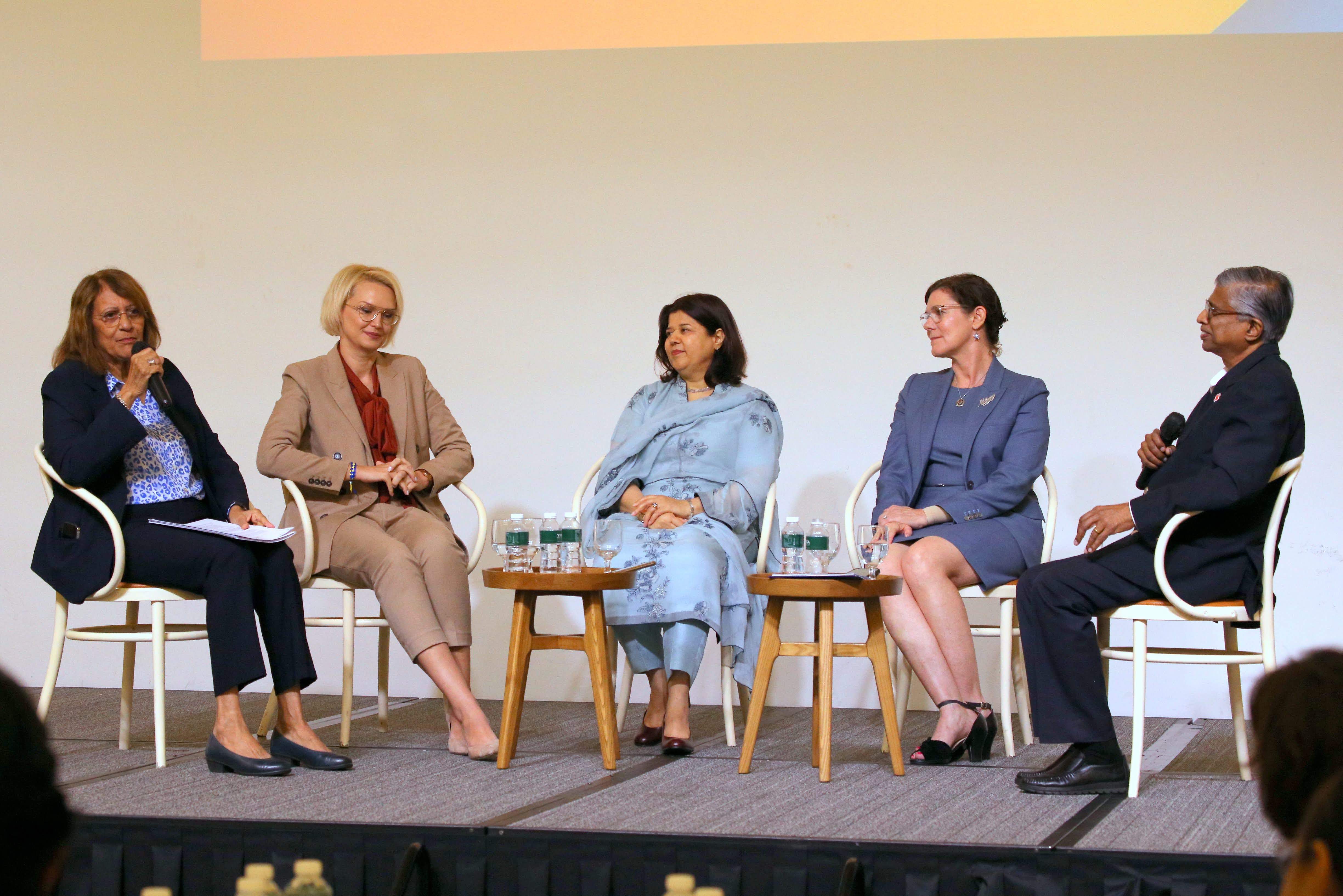
On a panel discussion, 'Women Ambassadors in Singapore - Breaking Barriers and Shaping Diplomacy', Diplomats H.E. Ms Gabrielle Rush, New Zealand High Commissioner to Singapore, H.E. Ms Rukhsana Afzaal, High Commissioner of the Islamic Republic of Pakistan to Singapore, H.E. Kateryna Zelenko, Ambassador of Ukraine to Singapore, and Ms Maria Natalia Guterres Viegas Carrascalao, Ambassador of the Democratic Republic of Timor-Leste to Singapore shared their journeys breaking barriers and shaping diplomacy. They shared insights and experiences, highlighting the importance of women's leadership in diplomacy, diplomatic efforts in addressing humanitarian challenges, and the role of international cooperation in building resilient communities. They also shared the challenges they faced, and how they navigated through their trials to make worthwhile contributions in the sphere of diplomacy, as well as the pearls of wisdom to inspire other women. The session was moderated by Mr Benjamin William, Secretary General/CEO, SRC.
Leveraging Privileges to Uplift Lives, Champion Gender Balance
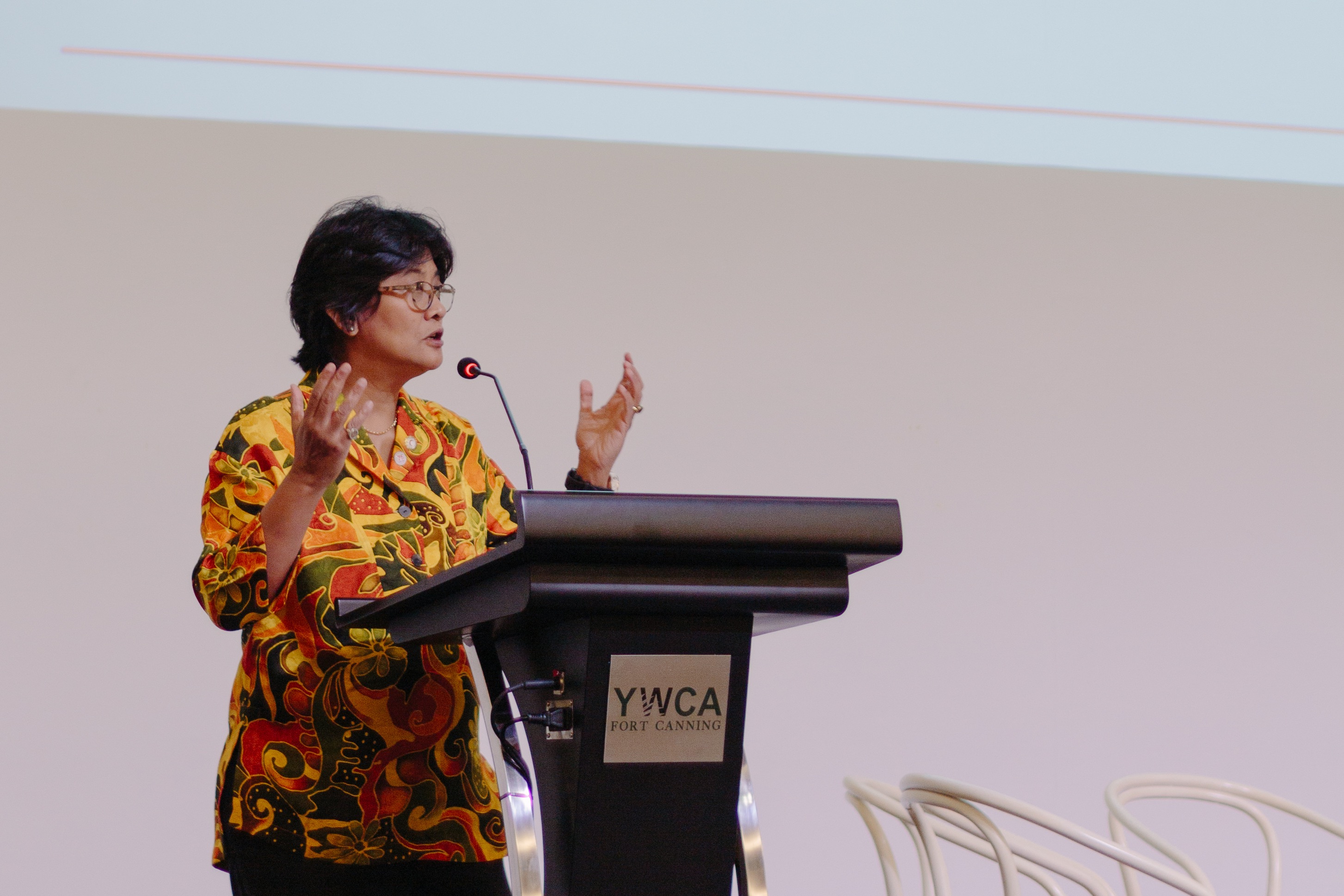
Her Highness, Dato’ Seri DiRaja Tan Sri (Dr) Tunku Puteri Intan Safinaz Binti Almarhum Sultan Abdul Halim Mu’adzam Shah, was elected to be the first woman chairperson in the history of the Malaysian Red Crescent Society in 2018.
She shared that women's empowerment within the Malaysian Red Crescent Society dates back to the 1950s in the Red Cross when women worked in the fields, and drove buses. She shared that currently, women constitute 30 per cent of the board of the Malaysian Red Crescent Society. She holds the conviction that more young women will remain in the Movement and take on leadership roles, paving the way for gender equitability.
Besides being a part of the Malaysian Red Crescent Society, she also plays a role on the governing board of the IFRC. The board of the IFRC has 50 per cent women representation. She shared her pride in being a part of an organisation with gender parity.
As the granddaughter of the first King of Malaysia, she shared that though her grandmother did not receive much schooling, her grandmother had campaigned for women to receive education. She shared that her mother and her aunt had a tertiary education overseas.
A child of the late Sultan of Malaysia, she shared that she found great role models in her parents who were the King and Queen of Malaysia. They were kind, caring, diligent and reliable. Notwithstanding their royalty status, they retained the human touch. Their kindness, compassion, diligence, and sense of responsibility shaped her into the woman she is today.
She felt fortunate that she could leverage her uniqueness and privileges to uplift the lives of people who require support, through education, public health, and collaboration with the authorities, corporates and grassroots organisations. Yet, she pointed out that her royalty status was comparatively less compelling on the international front. Instead, she leverages her interpersonal skills to listen intently, she speaks with measure, confidence and conviction to build trust. She also gleaned insights and lessons from the experiences and stories of others and the history of their country.
Championing equitable gender balance, she encouraged organisations to plan and organise programmes to groom talents and equip women with the knowledge, expertise and skills to take up leadership positions.
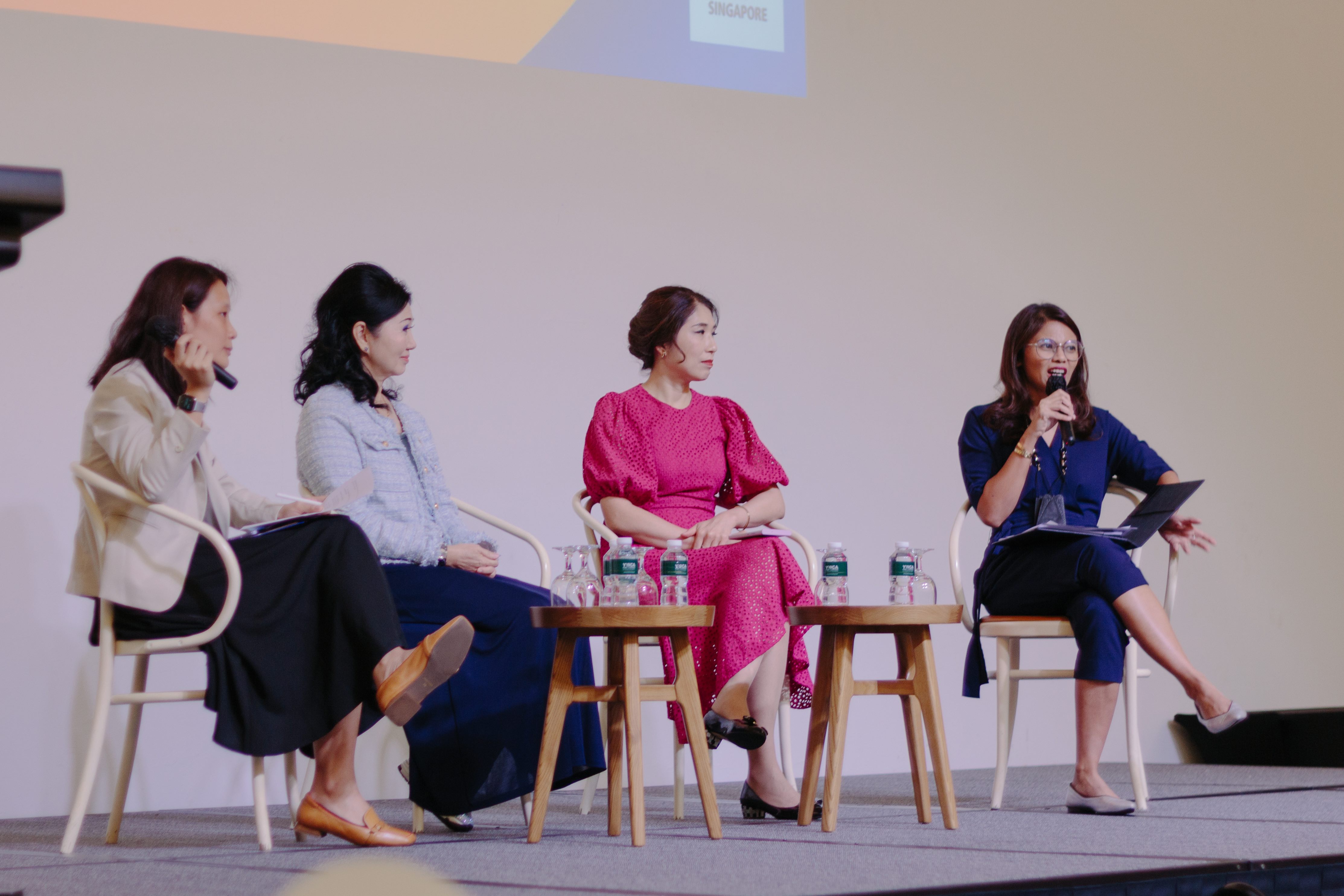
In the second panel discussion, 'Women in Business and Humanitarian Action: Empowering Communities', Council Members of the SRC, Ms Terene Seow, Chairman of the SRC Fundraising Committee, Financial Services Director of AIA who was a former Red Cross Youth cadet, Ms Emily Tan, SRC Council Member, Managing Director at TSM Consultancy Pte Ltd and Ms Usha Chandradas, SRC Council Member, Nominated Member of Parliament, Co-founder of Plural Art Mag, Tax Consultant shared the strides they made in humanitarian work and community empowerment. The discussion underscored the interweaving of business and humanitarian action, the importance of women's leadership in business, and the strength of collaboration between business and humanitarian organisations such as RCRC Societies. The discussion also cast the spotlight on their professional career, the pursuit of their passions as well as the hurdles they faced, and how they overcame them. Ms Charis Chan, Assistant Secretary General, Operations, SRC, moderated the session.
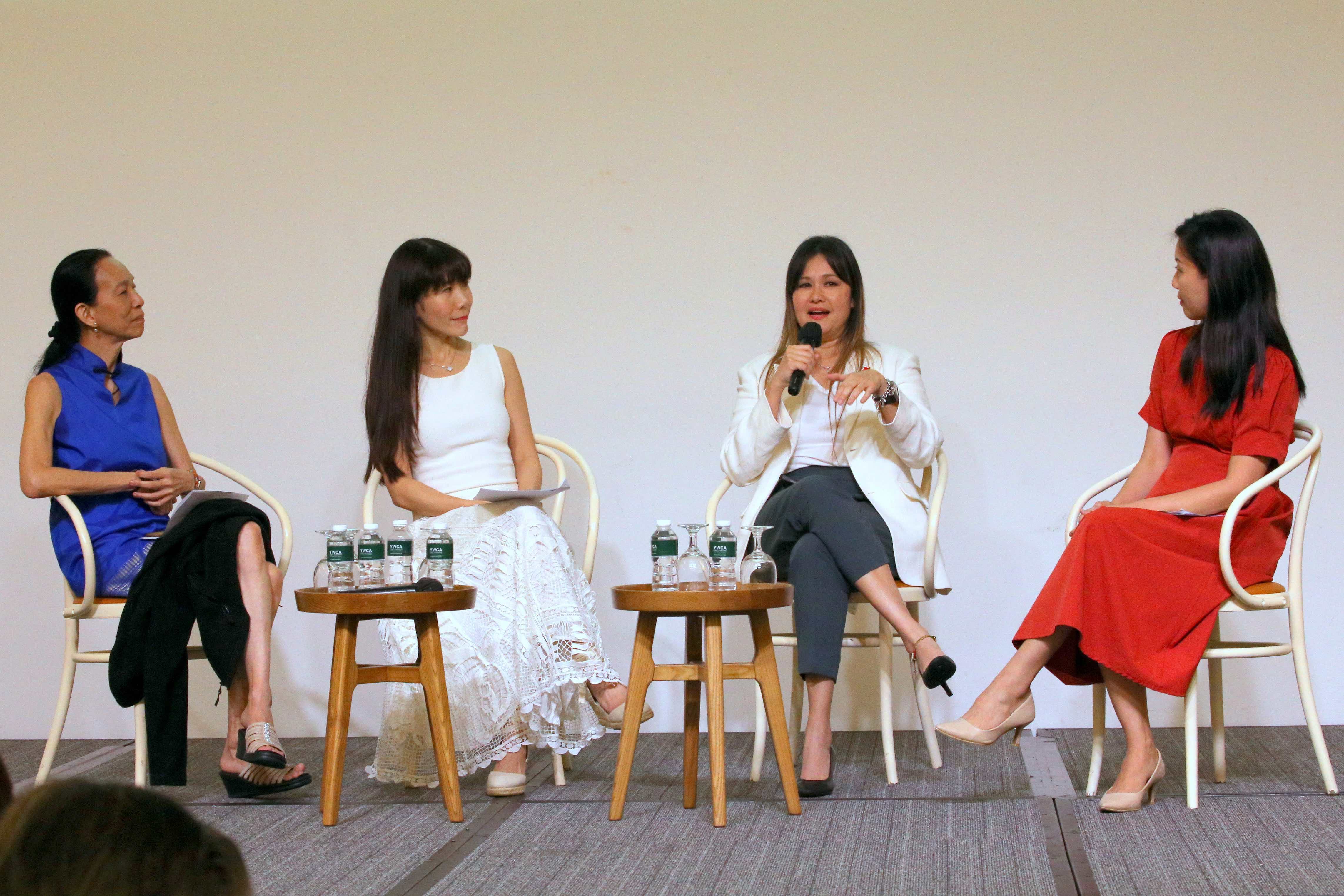
The third panel discussion, 'Inspiring Women in Social and Healthcare Sectors: Advocating for Humanitarian Action and Resilient Communities', brought together inspiring women from the social and healthcare sectors who are at the forefront of advocating for humanitarian action and driving social change in their communities. Ms Eunice Olsen, Social Advocate and Goodwill Ambassador of the SRC, Ms Eunice Yeo, Fundraiser and Friend of the SRC, Founder of Peace of Art and Associate Professor Ong Biauw Chi, Group Chief Risk Officer at SingHealth, Senior Consultant, Dept of Anaesthesiology, Singapore General Hospital & Sengkang General Hospital shared the predicaments encountered, inspiring journeys, highlighting their advocacy work, innovative projects and successful collaborations that have brought about positive impact. The session was moderated by Ms Eileen Cher, Assistant Secretary General, Corporate, SRC.
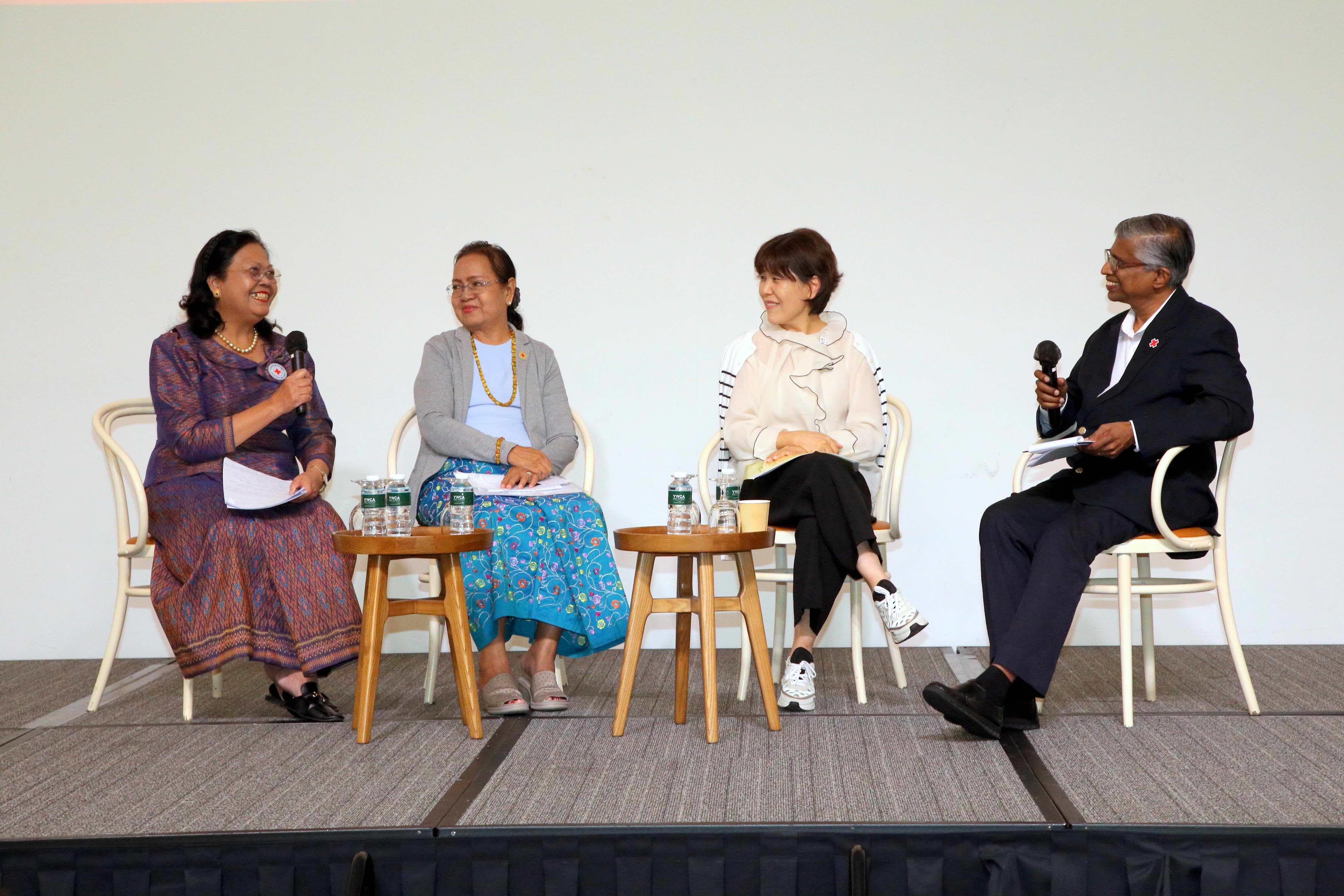
The fourth panel discussion, 'Women Leaders of the RCRC Movement: Advancing Humanitarian Solutions', brought together women leaders within the Red Cross Red Crescent Movement, who have been driving positive change and advancing humanitarian solutions in their respective roles. Ms Juja Kim, Deputy Regional Director, IFRC Asia Pacific Regional Office, Professor Dr. (Daw) Mya Thu, Executive Committee Member (EC), Myanmar Red Cross Society, and Men Neary Sopheak, 1st Deputy Secretary General, Cambodian Red Cross Society engaged in a robust discussion where they shared their inspiring journeys and experiences as they explore unique perspectives and approaches that women leaders bring to the humanitarian sector. They provided ideas on how women in the humanitarian sector can be champions for areas such as innovation and technology, and work together to reach out to vulnerable groups such as migrant workers and displaced persons. The session was moderated by Mr William.
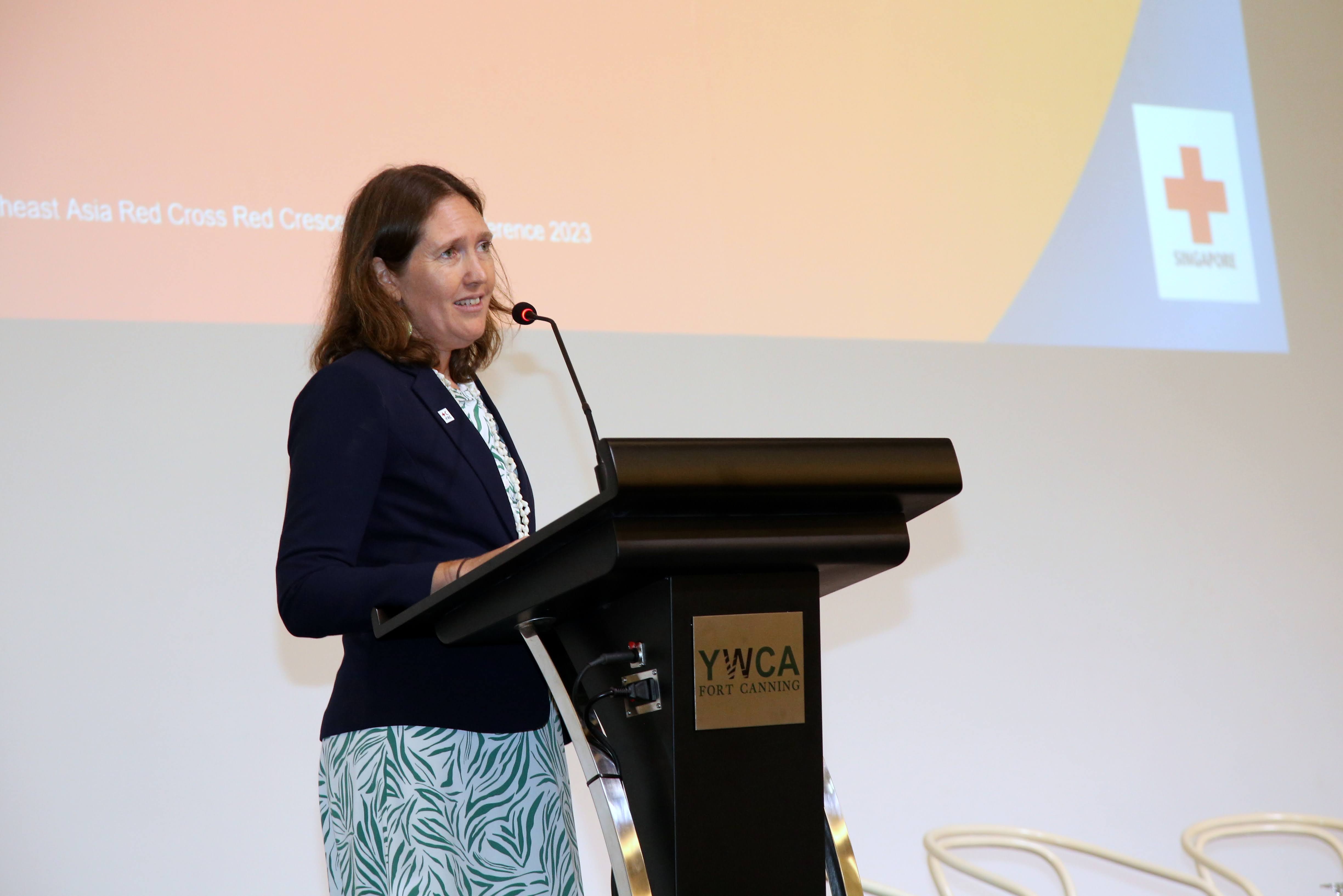
Ms Kathryn Clarkson, Chair, Women Leaders in Asia Pacific steering committee, IFRC rounded the conference by highlighting seven key points; namely the mobilisation of all, including women by setting targets, the importance of role models, the diverse kinds of leadership, confidence, the room to make mistakes, the removal of structural barriers and the importance of peers. She urged women to seize opportunities, hope and plan.
Mr William closed the session by expressing his gratitude to the speakers for their inspiring and insightful sharing, and the guests for attending the conference, including those who have travelled over from overseas. He encouraged women to maximise their potential, seize opportunities, and overcome adversity with fortitude, resilience and an indomitable spirit.
On the second day of the Women's Conference, the delegates from various National Societies in SEA and the IFRC had a close door discussion on the Women empowerment outcomes (targets) to be achieved by the Movement. Some areas that were discussed include establishing a women's peer-to-peer exchange programme, women as champions for digitalisation within their National Societies, and creating an online platform for women in SEA National Societies to exchange knowledge and ideas with one another. The outcomes statement will be presented at the 20th SEA RCRC Leaders Meeting in Cambodia in September.
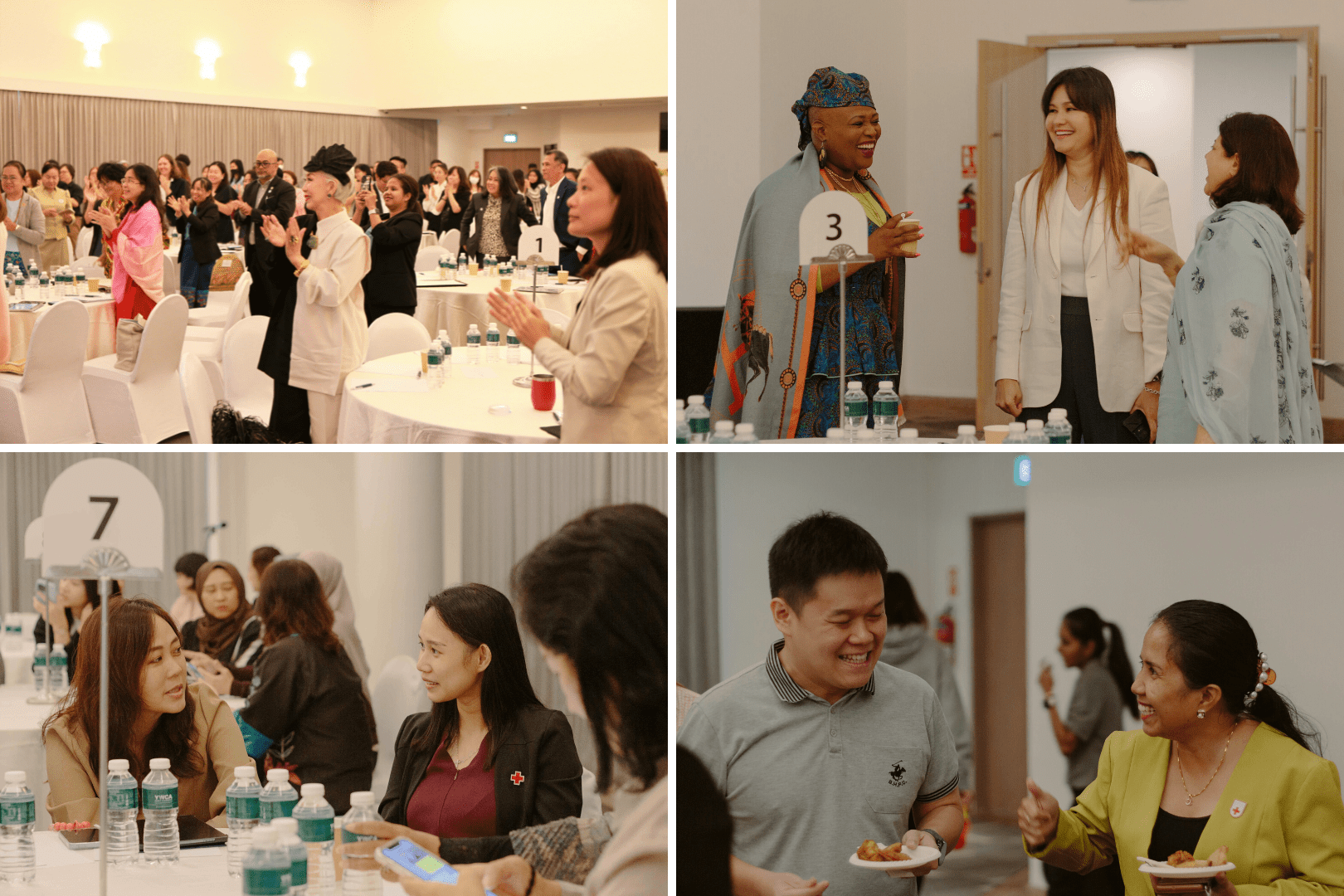
Photos by Wong Leong Jeam and Patrick Xu, volunteer photographers

